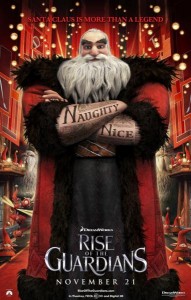Audio version included below.
It’s a very weird little universe that Rise of the Guardians elaborates, one in which the seasonal figures and personified forces of our culture exist in a secretive global popularity contest. Their very existence a manifestation of raw, widespread belief, icons like the Easter Bunny, Santa Claus, and the Tooth Fairy toil to spread their own unique spirit unto the world, be it the wonder of Christmas, the imagination of nighttime dreams, or the hope of spring rebirth as perceived by children.
This is a straightforward enough platform on which to tell stories involving these familiar characters, but the universe created by William Joyce in his book series, adapted by David Lindsay-Abair in his screenplay, and visualized by Peter Ramsay in his film goes a step farther and imagines another elaborate layer. You see, it turns out that, while the Toothfairy oversees her own little tooth-based economy and Santa Clause preps his yearly global gifting frenzy in an effort to, you know, continue existing, they are simultaneously watching over the world and its children, united by their status as Gaurdians and themselves guided by the Man on the Moon (deus ex luna?).
If this sounds like a perfectly franchisable, modular children’s film, you’re right- we’re soon to be overwhelmed by “The [blank] Avengers” at every turn, and thus with “The Holiday Avengers,” Dreamworks is merely ahead of the curve on this one. Fortunately though, Rise of the Guardians is very good, and in this so-so time for digital animation, it shines bright. While it all naturally has to loop back around to the chipper family movie status quo by its end, Rise of the Guardians is all about engaging with the ideas of belief and faith as they relate to children, and more specifically it suggests that perhaps a maturation of faith doesn’t require a child to leave behind their beloved Easter Bunny or Santa Claus. This is all heady stuff for a film that spends the VAST majority of its runtime blasting through a seemingly never-ending series of sweeping action sequences, pausing only for a little bit exposition and stakes-raising before tearing into a spectacular climax.
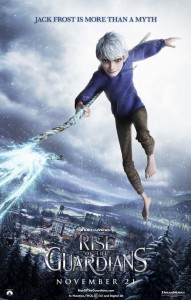 Our entry into this story of secret guardian groups and ideological war is Jack Frost, who after his mysterious birth finds himself stranded from contact with the world and isolated by the silence of the Moon that created him. Seriously, this kid’s film follows a hero that spends a significant amount of time struggling and failing to communicate with an unasnwering god. Limited to merely bringing about snow, frost, and the occasional snowball fight between children across the globe, Jack spends his time flying around, entertaining himself with childish pranks, and brooding about the his general lack of purpose since being borne of a frozen pond. Chris Pine lends his voice to Jack, and his cavalier tones and impetuous charm are a perfect fit. Jack’s strained, unfriendly relationship with the other mythological figures is suddenly challenged when an ancient force of nightmarish power returns and brings the Guardians to full activity, with the Moon seeing fit to finally give Jack a sign of purpose.
Our entry into this story of secret guardian groups and ideological war is Jack Frost, who after his mysterious birth finds himself stranded from contact with the world and isolated by the silence of the Moon that created him. Seriously, this kid’s film follows a hero that spends a significant amount of time struggling and failing to communicate with an unasnwering god. Limited to merely bringing about snow, frost, and the occasional snowball fight between children across the globe, Jack spends his time flying around, entertaining himself with childish pranks, and brooding about the his general lack of purpose since being borne of a frozen pond. Chris Pine lends his voice to Jack, and his cavalier tones and impetuous charm are a perfect fit. Jack’s strained, unfriendly relationship with the other mythological figures is suddenly challenged when an ancient force of nightmarish power returns and brings the Guardians to full activity, with the Moon seeing fit to finally give Jack a sign of purpose.
Pitch, voiced by Jude Law, is another marginal figure in the universe of the Guardians, reflecting Jack in his isolation and lack of defined purpose. A be-cassocked figure that mashes together an evil Neo with Agent Smith and a dash of Hades, Pitch is the ultimate boogeyman, whose power manifests as a spooky black shroud that forms into red-eyed equine nightmares (get it?). When Pitch manages to appropriate Sandman’s power to craft the slumbering dreams of children into his own tool for spreading terror, the Guardians are forced to prevent a return to the Dark Ages, a hopeless time when Pitch reigned supreme over a world with no pleasant dreams.
Rise of the Guardians is all about spectacle, and the plot never gets much more complicated than that. Relying on the tried and true Hero’s Journey structure to keep it together, it sends Jack through the absolute boilerplate steps of the dramatic formula by way of grand, propulsive set pieces. Be it Jack flying about the world, or Santa’s sleigh blazing through the atmosphere to challenge Pitch’s takeover of the Tooth Fairy fortress, all the way through the final climactic sequence that has the Guardians battling Pitch in suburban streets, the film rarely takes a breather. It operates on as frenetic a level as any kid’s cartoon, while using a fluid camera and consistent, coherent action filmmaking to remain accesible to those not indoctrinated by the flashing speed of Disney XD’s daytime lineup.
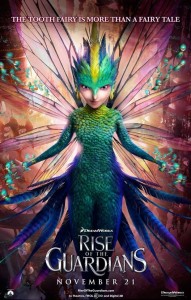 While this might sound like a hysteric sugar-addled nightmare to anyone over the age of 14, director Peter Ramsay ultimately triumphs at crafting a wonderful film that will entertain the young and the old in the crowd alike. Along with the aforementioned fluid filmmaking that keeps the action accessible, the film is also absolutely hilarious, with barely a beat passing by without a clever quip or visual gag. Alec Baldwin leads with a boisterous charm as the Ukrainian-accented Santa Clause, while Hugh Jackman plays the tightly-wound but dashing Easter Bunny and Isla Fischer voices a sweet but ferocious Tooth Fairy. They all have a great chemistry, and each forms their own relationship with Jack that finds humor and heart on different levels.
While this might sound like a hysteric sugar-addled nightmare to anyone over the age of 14, director Peter Ramsay ultimately triumphs at crafting a wonderful film that will entertain the young and the old in the crowd alike. Along with the aforementioned fluid filmmaking that keeps the action accessible, the film is also absolutely hilarious, with barely a beat passing by without a clever quip or visual gag. Alec Baldwin leads with a boisterous charm as the Ukrainian-accented Santa Clause, while Hugh Jackman plays the tightly-wound but dashing Easter Bunny and Isla Fischer voices a sweet but ferocious Tooth Fairy. They all have a great chemistry, and each forms their own relationship with Jack that finds humor and heart on different levels.
Dreamworks, having paid attention to what has worked elsewhere, has engineered the film to exploit some contemporary tropes of the CGI film, not least of which is including an army of homogenous, cute supporting characters. In this case they’re Santa’s elves, who are liberally sprinkled throughout the film for comedic relief. Fortunately they’re generally great, and they’re backed by Santa’s Yeti army, which also staff the North Pole and help suggest Mr. Clause has his own sort of Russian Christmas Mob going on. A great deal of clever writing and crackerjack visualizing ensures that the film hopscotches from laugh to laugh to action beat without missing a trick. That I can’t think of a single quip that fell flat speaks to how easily Guardians will win over crowds, and how well the film is likely to do.
For those that do plug into the action, the film has a lot to offer. Peter Ramsay –having storyboarded a ton of films like Predator 2, Men In Black, Independence Day, Fight Club, Minority Report and a ton more– knows his way around an action sequence and mixes equal parts Matrix-era Wachowskis and Potter-franchise Yates to create sweeping battles and energetic races. Once Pitch –with all his dark, viral texture– starts to take over, things become very Matrix Revolutions (there’s even homage by way of a few specifically replicated shots) while the boogeyman and Sandman go at each other with all the force and visual invention of Voldemort and Dumbledore doing battle. If you never quite got enough of the concussive magical dueling of Yates’ wizarding fights, you’re going to have a blast with Guardians. From time to time a sequence will get too swept up in its own momentum, but with every action sequence having some basis in expanding character or distinctly forwarding plot, it never drags the film down.
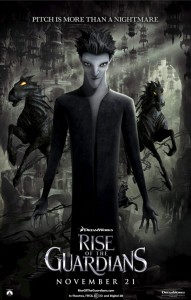 And it’s true, a lot of the fighting is that sort in which characters with vaguely defined “power” blast at each other, with it seeming like the upper hand is determined by little more than who has the most tightly clenched asshole at any given moment. Fortunately though, when it comes time to wrap things up, the mechanisms by which power shifts and battles resolve all make sense in terms of character, the mythological rules of the Guardians, and the symbolism the film tinkers with. Again, this is all about how children must eventually leave behind faith based on parent’s assurance and childhood memes, and eventually come to terms with belief based on observation. The suggestion is that faith can be restored and strengthened by the miracles we can actually witness. Obviously this requires one to be on the same page with a value system that holds faith as a virtue, and on an absolute level that might preclude the continuing belief in giant bunnies and quarter-distributing fairies. Fortunately, even when deigning to the fact that they’ve got a franchise to start here, it all makes some sense, and pays off a thematic ambition not usually present in these films.
And it’s true, a lot of the fighting is that sort in which characters with vaguely defined “power” blast at each other, with it seeming like the upper hand is determined by little more than who has the most tightly clenched asshole at any given moment. Fortunately though, when it comes time to wrap things up, the mechanisms by which power shifts and battles resolve all make sense in terms of character, the mythological rules of the Guardians, and the symbolism the film tinkers with. Again, this is all about how children must eventually leave behind faith based on parent’s assurance and childhood memes, and eventually come to terms with belief based on observation. The suggestion is that faith can be restored and strengthened by the miracles we can actually witness. Obviously this requires one to be on the same page with a value system that holds faith as a virtue, and on an absolute level that might preclude the continuing belief in giant bunnies and quarter-distributing fairies. Fortunately, even when deigning to the fact that they’ve got a franchise to start here, it all makes some sense, and pays off a thematic ambition not usually present in these films.
The film is a gorgeous one, accentuating Ramsay’s direction with beautiful, varied environments and brightly realized characters vividly expressing themselves. The animators have pitch perfectly rendered slapstick and spectacle with great timing, and the 3D is comfortable and immersive. CGI animation tends to lend itself to more justifiable 3D than a lot of live-action blockbusters, and Guardians is no different- it delivers some of the best use of the format yet with a good balance of in-your-face silliness and more subtle layering.
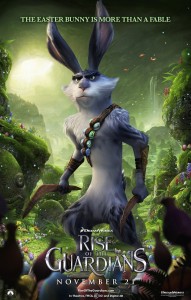 One cannot simply point to the rich source material, or hints of Guillermo Del Toro’s involvement, or Ramsay’s energetic direction, or Lindsay-Abair’s sharp script to figure out what makes Guardians work so well- it’s all of those things. While the film is surely a franchise initiate, it reminds us that –as the big P starts to look backwards as often as forwards– there are other capable animation studios in town and there’s intellectual competition in the market these days. Rise of the Guardians is the best animated film of the year, and among the year’s most entertaining films, period. It goes very big without losing the power of small moments, and the result is an action-packed, heartfelt spectacular. No wheels are reinvented, nor lives set to be changed, but it’s a more-than-solid animated entry from a maturing studio.
One cannot simply point to the rich source material, or hints of Guillermo Del Toro’s involvement, or Ramsay’s energetic direction, or Lindsay-Abair’s sharp script to figure out what makes Guardians work so well- it’s all of those things. While the film is surely a franchise initiate, it reminds us that –as the big P starts to look backwards as often as forwards– there are other capable animation studios in town and there’s intellectual competition in the market these days. Rise of the Guardians is the best animated film of the year, and among the year’s most entertaining films, period. It goes very big without losing the power of small moments, and the result is an action-packed, heartfelt spectacular. No wheels are reinvented, nor lives set to be changed, but it’s a more-than-solid animated entry from a maturing studio.
Oh, and while Thanos doesn’t show up to tease Galaxy of the Guardians or whatever, stick around for some nice mid-credits bits.
Rating: 




Out of a Possible 5 Stars
AUDIO: Here’s the audio version, with all its little starts and stumbles. Also, I refer to William Joyce as “her” which is not the case, so apologies to Mr. Joyce.
